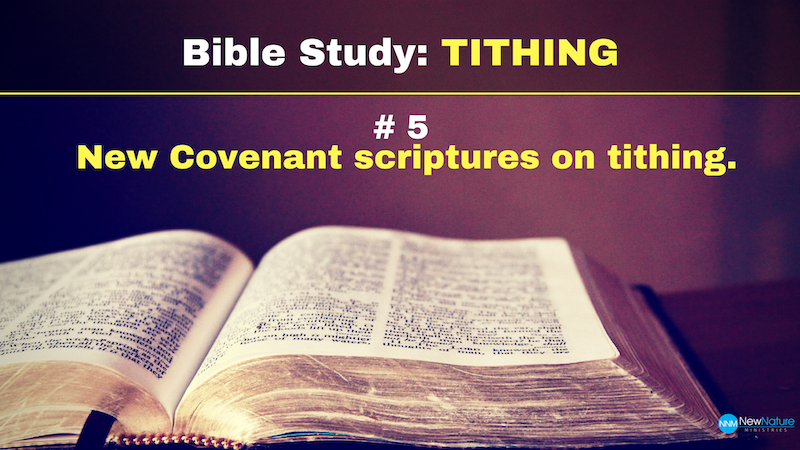 Of course there are no New Covenant scriptures that explicitly say that a believer should tithe. So if you’re looking for a reason not to tithe or to encourage as many believers as you can not to tithe into their local church, then I guess you could use this. However, we shouldn’t be too quick to ignore the New Covenant scriptures that are very likely referring to tithing, or at least to putting God first in our finances by faithfully giving to God first.
Of course there are no New Covenant scriptures that explicitly say that a believer should tithe. So if you’re looking for a reason not to tithe or to encourage as many believers as you can not to tithe into their local church, then I guess you could use this. However, we shouldn’t be too quick to ignore the New Covenant scriptures that are very likely referring to tithing, or at least to putting God first in our finances by faithfully giving to God first.
Here are three of these scriptures:
1) Giving yourself first to God with your finances.
2 Corinthians 8:1-7
“Moreover, brethren, we make known to you the grace of God bestowed on the churches of Macedonia: that in a great trial of affliction the abundance of their joy and their deep poverty abounded in the riches of their liberality. For I bear witness that according to their ability, yes, and beyond their ability, they were freely willing, imploring us with much urgency that we would receive the gift and the fellowship of the ministering to the saints. And not only as we had hoped, but they first gave themselves to the Lord, and then to us by the will of God. So we urged Titus, that as he had begun, so he would also complete this grace in you as well. But as you abound in everything—in faith, in speech, in knowledge, in all diligence, and in your love for us—see that you abound in this grace also.”
When Paul writes to the Corinthians about the financial gift they said they would send to help believers in need, he reminds them of the Macedonian Christians who gave an abundant financial gift by the grace of God. He explains to them that they “first gave themselves to the Lord” and then to Paul. This clearly shows they did two things. They gave first to God and then to Paul. Now we can try and say that the first giving was of themselves spiritually to God and the second was financially to Paul, but the words “and then to us” from verse 5 shows that the style of the first giving is the same as the second, which is financial.
Now the verse doesn’t say that it’s referring to tithing, but it does seem that the Macedonian church lived by a commitment of giving to God first. Well tithing is a commitment of giving God your first 10%. So though it doesn’t explicitly say they tithed, it quite obviously indicates they were doing something that very much resembled tithing. It’s hard to say that it’s not referring to tithing and I tend to believe it is. If it’s financial giving to the Lord first, well then it would seem very obvious that they still believed in tithing, even though the New Covenant doesn’t explicitly say we should tithe. But God never told Abraham or Jacob to tithe, they voluntarily gave it to God without being forced, just like the Macedonian church voluntarily gave to God first, and just like we don’t need to be told to tithe, we do it voluntarily because God is first in our life including our finances.
2) Giving according to your income.
1 Corinthians 16:1-2
“Now about the collection for the Lord’s people: Do what I told the Galatian churches to do. On the first day of every week, each one of you should set aside a sum of money in keeping with your income, saving it up, so that when I come no collections will have to be made.”
Paul here is speaking to the Corinthian church and asking them to give some money at church when they go on Sunday (the first day of the week), and to do this according to how much income they earn. Now this offering was to send aid to the church in Jerusalem who were struggling because of a famine and therefore may or may not actually be talking about tithing. However, it does show that Paul had no problem asking the Corinthians and the Galatians to do this kind of giving where you give to the church on Sunday, every time you get paid, and according to how much you get paid.
Now “in keeping with your income” could refer to a percentage of your income, or it may just refer to any amount you decide. However, we can’t get away from the fact that Paul is asking the church to give, regularly, consistently, faithfully, intentionally and strategically, instead of some haphazard free-will free-spirited giving only when they felt moved by the Spirit.
Let me ask those that only believe in giving whatever you feel in your heart, have you even taught people to give every Sunday at church in keeping with their income, as Paul did? Surely it’s not anti New Covenant for a church to ask its members to give a certain sum of money every time they receive their income and in keeping with their income. Paul, that great apostle of the New Covenant certainly had no problem in doing this and I’m happy to be in his company. In fact I believe you are keeping people immature and selfish when you don’t place a financial responsibility on them to carry a burden for the welfare of the church and for people in need. They are like spoilt kids who just expect their parents to pay for everything even once they have left the home!
3) God has ordained that those who preach the Gospel should be taken care of by those who receive the Gospel.
1 Corinthians 9:13-14
“Do you not know that those who minister the holy things eat of the things of the temple, and those who serve at the altar partake of the offerings of the altar? Even so the Lord has commanded that those who preach the gospel should live from the gospel.”
Paul interestingly draws a parallel between fulltime New Covenant ministers of the Gospel and Old Covenant Levitical priests who ministered in the temple. He says that just as God commanded (or ordained) the priests to be taken care of in the Old Covenant, so He has commanded that ministers of the Gospel in the New Covenant should also be taken care of.
How did God ordain the priests to be taken care of?
Numbers 18:21 “Behold, I have given the children of Levi all the tithes in Israel as an inheritance in return for the work which they perform, the work of the tabernacle of meeting.”
How does God ordain ministers of the Gospel to be taken care of? I would say it’s pretty obvious, since Paul draws such a strong parallel between the two, that it refers to the tithe.
I believe God has ordained the tithe in the New Covenant to guarantee a continuous provision for the Church and those who minister the Gospel full time. I believe since we are all called to belong to a local church, this is where we should give our tithe.
On a side note:
Is receiving a salary for preaching the Gospel an abuse of the Gospel? Some people quote 1 Corinthians 9:15-18 to say that Paul never received a salary and that he considered that receiving a salary was an abuse of the Gospel. But this interpretation is wrong and painfully out of context. Paul was simply saying that he would never charge money in exchange for preaching the Gospel. This was because his motive for preaching the Gospel was never money. Paul was compelled to preach the Gospel and the idea of charging money for preaching it, was for him, an abuse of the Gospel. This is the point he was making. Paul was not saying that he is against ministers of the Gospel receiving a salary. He just spent half a chapter saying that they should be taken care of financially because that is what God has commanded. Paul actually did received a salary at times for preaching the Gospel! In fact while he was preaching to these very Corinthians he was receiving wages from other churches. Most people who misquote verses 15-18 ignore what Paul says later to the same Corinthians:
2 Corinthians 11:7- 9
“Did I commit sin in humbling myself that you might be exalted, because I preached the gospel of God to you free of charge? I robbed other churches, taking wages from them to minister to you. And when I was present with you, and in need, I was a burden to no one, for what I lacked the brethren who came from Macedonia supplied.”
Now back to my point:
People could argue that 1 Corinthians 9:13-14 may just be referring to freewill giving for those who preach the Gospel, and that it doesn’t necessarily mean the tithe. Well fair enough because it doesn’t exactly say that it refers to tithing. However, I do find it interesting that Paul relates these ministers of the Gospel in the New Covenant, who God says should receive financial support, to the priests of the Old Covenant who were financially supported by the tithe! It seems quite clear to me that God has ordained a way of taking care of the ministers of His Gospel in the New Covenant by the faithful financial giving of His people. If the tithe belonged to God before the Law, being received and administered by the High Priest Melchizedek, and if it also belonged to God during the Law being received and administered by the Levitical priesthood, then doesn’t it seem logical and biblical that it still belongs to God now in the New Covenant to be received and administered through Christ’s Body here on earth, the Church?
I guess it is up to you to decide where you stand. I for one delight in faithfully giving my tithe to a church that preaches the glorious Gospel of Christ and represents Him well on the earth. It fills me with joy knowing that the ministers of the Gospel can get on with the job and not have to waste the resources of their time and energy just trying to have enough faith for the finances to fund the Gospel. I believe the Gospel would speed up around the world and have a far greater impact if God’s people did nothing else financially but simply tithed.
By Ryan Rufus.
P.S. Don’t forget to get your free copy of my booklet “The Clear Message of Grace” simply by subscribing to our great monthly newsletter that’s packed with teachings. (SUBSCRIBE HERE)
Tithing Series:
#1: Tithing shouldn’t divide us!
#2: What I don’t believe about tithing.
#3: Why we can’t dismiss Abraham’s tithe.
#4: Six pictures of New Covenant tithing from Abraham.
#5: New Covenant scriptures on tithing.
Other articles you might like:
Is tithing part of the New Covenant?
Find out more about:



